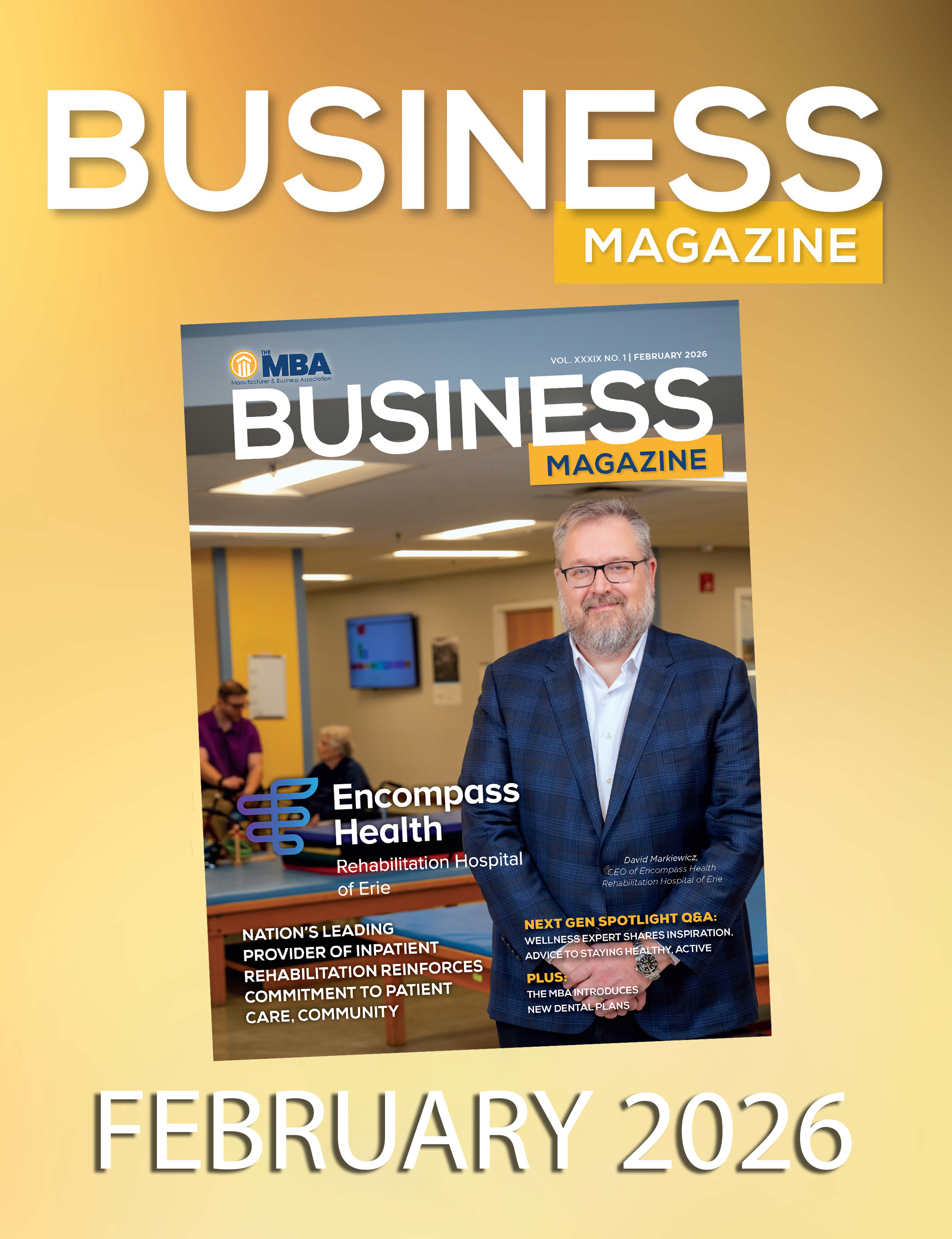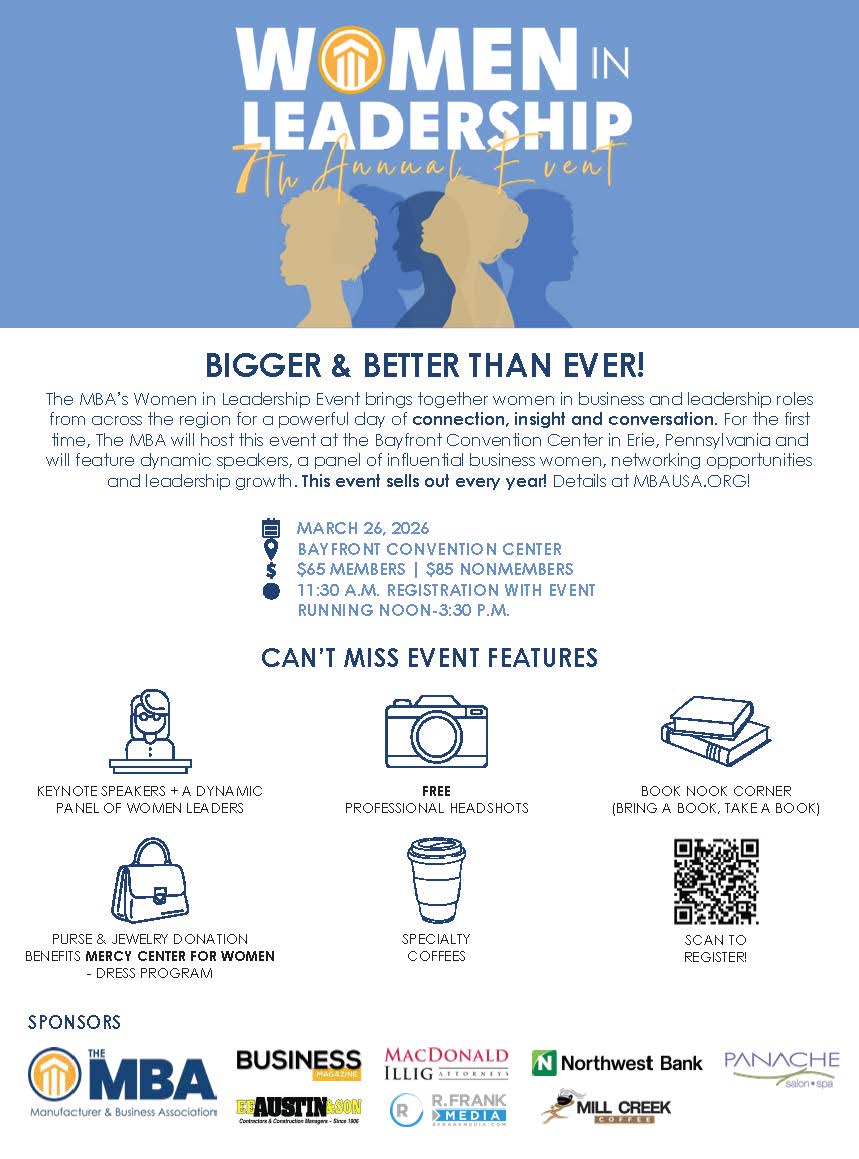In celebration of The MBA’s 120th year, the Association is recognizing Icons of Industry for their many contributions to The MBA and business community. Here, Don Fazio, chairman of Diamond Wire Spring Co. (DWS), a designer and manufacturer of industrial custom and stock springs since 1939, discusses his professional journey and the third-generation, family owned company’s rich history in Pittsburgh.
You’ve had a remarkable career at Diamond Wire Spring. Tell us about the company’s history and the leadership of your father and mother, which led to the company being owned and operated for three generations.
Back in 1939, my father and four other men started Diamond Wire Spring in a little garage in the Bloomfield area of Pittsburgh shortly before World War II broke out. All five men had other jobs. My dad, a metallurgist who graduated from the University of Pittsburgh, was running Braeburn Steel Mill in New Kensington. When the war ended, he wanted his own company, and my mother, a well- educated Northwestern University graduate, said to him, “You know how to make steel, and springs are made out of steel, so why don’t you buy out the other men from that little spring company?” So that’s what they did, and they scraped together all of their savings, everything they had to buy out the four other men.
In 1947, my father became sole owner and president of Diamond Wire Spring and ran the company for 12 years. Then, in 1959, at the young age of 49, he suffered a heart attack (he had seven children at home, ages 14 to nine months). The day before he died, he had told my mother (age 40) in the hospital to sell the business, and she said, “No, I cannot sell the business that you worked so hard for.” And so he gave her a name of someone who could help her run it, and he died the very next day. The funeral was on a Saturday and on Monday morning, she came in to the office and told the 19 employees that she was going to try to make it on her own, and God bless her, she did it. She held it together from 1959 until my oldest brother entered the business in 1969, and I entered the business in 1972.
Tell us about your professional journey in the company.
I would go to work with my dad on Saturdays starting when I was 7 years old. So, when he died, I already knew at age 10 that I wanted to work as a spring maker.
I went to college and graduated from Franciscan University of Steubenville, Ohio, as a business administration/economics major. It was during the Vietnam War, and just like my two older brothers, I got drafted into the service. I was in the Army and served in southern Germany for two years as a company clerk because I had a college degree. My time there prepared me well for the business world because I watched how my company officer ran the unit, and I learned how to take everything one step at a time.
At that time, I got married, and my wife, who also graduated from Franciscan, was able to join me in Germany and worked on the base teaching. When we came back to Pittsburgh in 1972, I went right into business as plant superintendent. We had just opened our first branch plant in Greenville, South Carolina, and my oldest brother Art went down there to run it.
I spent two years in production here and was then moved to the front office where I worked in engineering, sales and customer relations. In 1976, my mother basically said, “You take over running the company,” and I became the general manager/president.
From there, through a family effort in 1982, we started our third manufacturing plant in Tyler, Texas. Then, in 1985, we opened our Catalog Division here in Pittsburgh. In 2019, I became chairman, and an executive committee was formed with my nephew Chris Fazio as president, and son-in-law Kelley Christy and nephew Frank Fazio Jr. as executive vice presidents.
As chairman, what do you believe has been the key to Diamond Wire Spring’s success in a competitive manufacturing market?
Every family business has its own set of challenges. It’s not easy. You’re bound to have conflicts, and we did, but we were able to work through them. And ultimately, at the end of the day, we had each other’s backs and we had the same goal — to keep growing the company. We were fortunate to have a lot of non-family key employees that worked with us too, and if you have that type of combination, you can pretty much handle anything that comes down the road.
How do you ensure that Diamond Wire Spring stays innovative and ahead of industry trends while maintaining the values that have made the company successful?
There are no guarantees in business. We always tell the employees, “You know things can change inside of three or four months, so you have to take big rocks and pound them into little rocks every day.” At Diamond, we also reinvest heavily. We’re constantly replacing machinery or adding machinery, and we try to continue to educate the employees on spring making.
What do you see as the most important factors for long-term growth in business?
Strong leadership with good communication that filters its way down to the employees is important. You also have to reinvest and, in today’s environment, all manufacturers, all businesses are experiencing one major challenge, which is finding capable workers. That’s hard to do today as people retire, trying to find people to replace those skill sets if you have an employee for 20, 30 or 40 years. Knowledge is very valuable, and probably more than anything today, you have to have outstanding customer service.
With advancements in technology and automation, how has Diamond Wire Spring adapted to remain competitive and efficient?
It’s so important to reinvest with new equipment. I always say that if you don’t have a three-year capital expenditure plan, you’ll look at your machinery and say, “We’ll never catch up.” We go to tradeshows to see the latest and greatest equipment, so that’s part of our DNA at Diamond.
DWS is also a member of The MBA. How has being involved with the Association benefited Diamond Wire Spring?
The training programs have always been really good as well as meeting other people in the manufacturing world.
What’s the outlook for Diamond Wire Spring in the near future?
Nobody has a crystal ball in today’s business environment, but at Diamond, I think we’re in a good position. We have new employees in all locations who are learning spring-making skilled positions. I believe that, along with the equipment we’ve bought and the leadership we have in place, both family and non-family we will be able to handle whatever comes down the road.
For those looking to take on leadership roles within their companies, what advice would you give based on your experience leading Diamond Wire Spring?
Have a positive outlook that no matter what the problem is, there’s always a way to resolve it. I took a class one time at CMU (Carnegie Mellon University). It was a 12-week managerial course, and we had a guest speaker who was a very successful businessman in the Pittsburgh area. The first thing he said was, “I tell my people who are in charge of hiring, hire nice people, and then we can train them for our business.” Everybody likes people who they like to be around during the day, and that includes bosses and leaders.
To learn more about DWS, visit diamondwire.com.


















